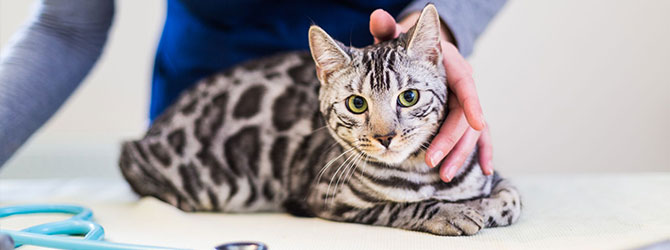What is colitis in cats?
Colitis in cats is a digestive disease that causes inflammation of the colon – also called the large or lower intestine
It can cause pain and discomfort in your cat, as well as diarrhoea or constipation.
Brief summary...
- Colitis is a common cause of diarrhoea, and can lead to inflammatory bowel disease
- Symptoms include straining, constipation, weight loss and more
- Common causes include IBS, worms, stress and food allergies/intolerance
- Colitis is fairly common and easy to treat – contact your vet if you’re concerned
- Routine healthcare treatments and a healthy diet can help to prevent colitis
What is colitis?
A relatively common condition, colitis can affect both animals and humans. Like many conditions, it’s usually described as chronic – meaning slow to develop, but persistent – or acute, meaning it flares up quickly and may be intense.
Colitis can be painful and uncomfortable for your cat, and is responsible up to half of all cases of chronic diarrhoea. While it’s relatively common and easy to treat, feline colitis can lead to inflammatory bowel disease (IBD), which is a more serious condition.
If your cat is displaying any of the signs and symptoms of colitis listed below, make an appointment with your local vet.
Colitis in cats symptoms
Be on the lookout for several of these common colitis symptoms in various combinations:
- Watery or bloody diarrhoea
- Mucous or jelly in the stools
- Excessive straining
- Constipation
- Excessive flatulence
- Loss of appetite
- Weight loss
- Frequent need to go to the toilet
- Lack of appetite or disinterest in food
- Stomach cramps
Common causes of colitis in cats
- Irritable bowel syndrome (IBS)
- Intestinal worms (including lungworm, heartworms, whipworms and hookworm)
- Stress
- Viral or bacterial infection
- Food allergies or dairy intolerance
- Eating things he shouldn’t – as a result of scavenging in bins, for example
- Gastrointestinal infections, such as salmonella or giardia
- Injury to the colon
Treating your cat's colitis
Your vet will recommend a treatment programme, depending on the severity of your cat’s condition. They'll usually recommend fasting for 24 to 48 hours, then introducing a special high-fibre or bland diet.
They may recommend a course of antibiotics or anti-inflammatory medication to treat any underlying infection, and a worming treatment to remove any gastrointestinal worms that can cause or exacerbate colitis.
While colitis can be painful and uncomfortable, it’s normally very treatable, and the prognosis is generally good.
Can I prevent my cat from getting colitis?
While it’s not possible to completely prevent feline colitis, taking the following steps may help to reduce your cat’s chances of developing it:
- Get into a regular worming routine
- Get into a regular flea treatment routine – as fleas can lead to worms
- Keep your cat’s vaccinations up to date
- Feed your cat a balanced, high-fibre diet and plenty of water to drink
- Ensure your cat doesn’t eat things they’re not supposed to
- Avoid sudden changes to your cat’s diet
- Keep stress to a minimum
Need more info?
For expert advice on colitis in cats get in touch with your local vet.
Find your nearest vet using our find a vet page, or speak to a vet online using our onine video vet service.

